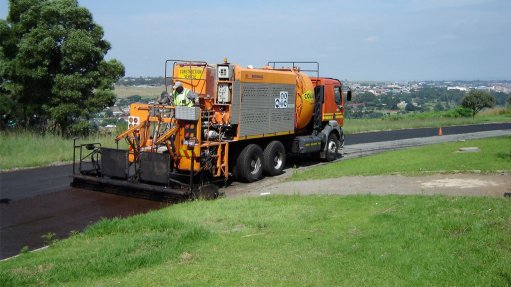
PAVING THE WAY The single truck needed to apply the Colbifibre
Transport infrastructure specialists Bouygues Group’s South African subsidiary Colas has introduced Colbifibre – its latest bitumen binding process – for use on deteriorating roadways.
Colbifibre is a new process aimed at road surfaces that have suffered significant wear and tear. It combines its Colmat L microsurfacing with in situ cut glass fibres and the material is suited to the requirements of not only road authorities and municipalities but also private clients such as those managing housing estates and shopping malls.
The process entails applying the microsurfacing to the surface unheated, after being mixed with the Colbifibre. This technique reduces production costs, as well as the carbon footprint on site, where harmful emissions which might have been generated – conventional applications use heated bitumen – are reduced. The Colbifibre process offers more safety to workers applying the bitumen, as the lower temperature of the application reduces the incidents of bitumen burns and fire hazards.
Adding fibre to the surface treatment slows the spread of cracks and enhances the performance of the microsurfacing in dense and heavy traffic. “The Colbifibre microsurfacing sets quickly, allowing traffic back on the same day without the risk of damage to the surfacing,” comments Colas commercial communications and marketing manager Herman Groenewald.
Colbifibre, initially developed and tested in France in 2012, was successfully used in its first trial section in South Africa in October 2015. The stretch was approved by the Mogale City local municipality, in Krugersdorp, and proved to be a great success, according to Groenewald.
Other benefits of the Colbifibre are that it requires fewer workers on site and only one microsurfacing truck is needed for a crew, in comparison with standard hot mix asphalt, which causes additional traffic disruptions, as it requires a large team and several pieces of equipment. A Colbifibre microsurfacing team can complete a 1 km stretch, on average, in between two to three days and the roads can be reopened to traffic within hours after completing the surfacing.
Further, Colbifibre restores skid resistance, which, in turn, lowers the risk of skid-related vehicle accidents.
“Our ISO 9001 certification means a consistent level of quality at all production facilities for clients. Colas supplies the full range of bituminous binder products for road surfacing,” notes Groenewald.
He adds that the company’s services include the supply of bitumen emulsions, modified binders, penetration and cutback bitumens, as well as conventional slurries and microsurfacing.
“By increasing the service life of roadways, Colbifibre defers large investments for rehabilitation,” Groenewald concludes.